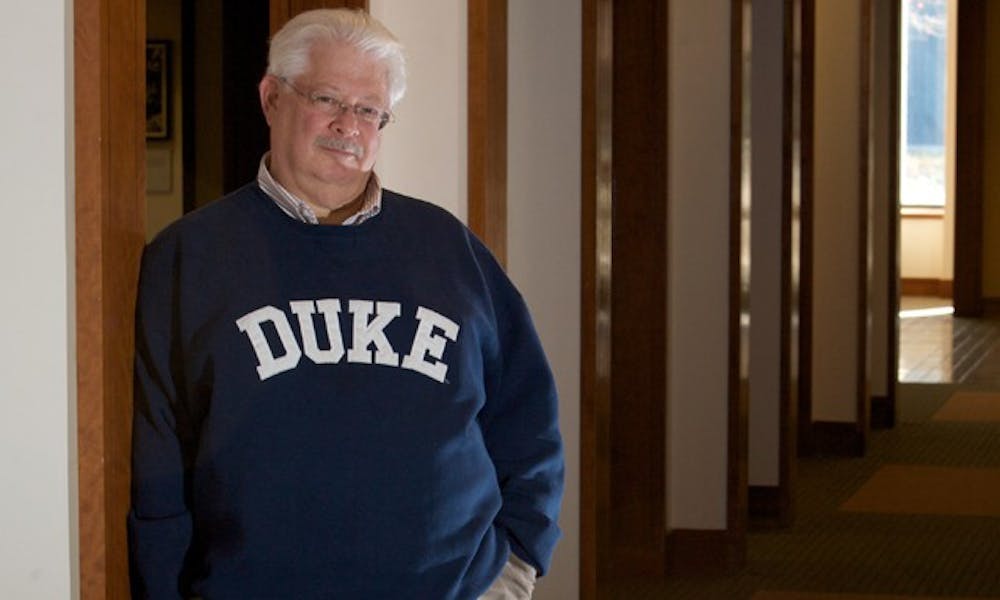John Burness, former senior vice president for public affairs and government relations, died Monday at 77 years old. He is remembered for his furthering of Duke-Durham relations, his mentorship and the relationships he cultivated on campus and in Durham.
Burness began his role in 1991 and retired in 2008. He served under three presidents — H. Keith H. Brodie, Nannerl O. Keohane and Richard Brodhead. He was directly responsible for the University's offices of news and communications, community affairs, and government relations in Washington, Raleigh and Durham, and was also an advisor to trustees, deans, faculty and student leaders.
As Duke’s chief communications officer, Burness guided Duke through the 2006 lacrosse case, when three Duke lacrosse players were falsely accused of rape.
Seyward Darby, Trinity ‘07, served as editor of the 101st volume of The Chronicle in 2005-06. Darby, now editor in chief of The Atavist Magazine, recalled that when the news of the lacrosse case broke, Burness called her into his office for an off-the-record conversation.
"When I entered the building, he was waiting for me on the stairs. ‘Are you ready for this?’ he asked me. He knew just how intense life was going to become for the staff of The Chronicle, as we reported independently on the story. We didn't always agree on matters, but Burness took my opinion and the newspaper's work seriously,” Darby wrote in an email to The Chronicle.
David Graham, Trinity ‘09 and editor of the 103rd volume of The Chronicle in 2007-08, remembered Burness as a great storyteller, an honest spokesperson and an educator to student journalists.
Hundreds of students at The Chronicle were touched by his teaching, including that of the importance of free speech, according to Graham, who is now a staff writer at The Atlantic and an adjunct instructor at the DeWitt Wallace Center for Media and Democracy.
Graham also highlighted Burness’ commitment to student journalism. As Duke faced lawsuits from members of the lacrosse team in 2007 and reporters swarmed campus, Burness always made sure Chronicle reporters were getting access to information and former president Richard Brodhead, Graham said. If there were big stories, he would tell Chronicle staffers before going to other outlets.
“While I knew his job was to spin, he was always honest with us too. He wouldn’t tell us everything, but he would not lie to us. Those are all things I just really respected about him,” Graham said.
Ultimately, Graham said, Burness’ time as Duke’s spokesperson helped the University rise in prominence.
“If you look at the [lacrosse story], the University went through a fire storm and ended up really coming out pretty well,” Graham said. “And I think that is a testament to his deft touch in the time he was here.”
Michael Schoenfeld succeeded Burness as vice president for public affairs and government relations in 2008 and left Duke this year. He described Burness as a "friend and mentor to me for more than 30 years, long before I had the honor of succeeding him."
"He patiently tutored me in higher education communications when I moved from Washington, D.C. to Vanderbilt and he remained counselor, advisor and conscience until he passed away far too soon. John was a mensch in every sense of the word. His joy in all things Duke and Durham was infectious, as was his commitment to integrity and honor," Schoenfeld wrote in an email to The Chronicle.
Burness also made a lasting impact on the Durham community. He helped establish the Duke-Durham Neighborhood Partnership in 1996, which partnered with 12 Durham neighborhoods and led to increased home ownership, improved student achievement and greater healthcare access for residents. The partnership raised more than $16 million between 1996 and 2008. Burness was also the founding chairman of the Board of Directors of the Durham Communities in Schools dropout prevention program.
Sam Miglarese, deputy chief administrator to the vice president for Durham and community affairs, recalled when alumni reached out requesting "$5000 seed money to begin the house course Durham Giving Project, John Burness without hesitation found the resources that was the impetus for this course that has continued for 17 years."
The two worked together to make sure Duke students were involved in his vision and social action projects for the Duke-Durham Neighborhood partnership.
"To the community of Duke and Durham, he was larger than life for all of us. He is also remembered for this warmth, openness and authentic relationships with all that served the campus," Miglarese wrote in an email to The Chronicle.
David Folkenflik, an NPR media correspondent, met Burness when he was a student reporter for the Daily Sun, the independent student newspaper at Cornell University, and Burness was vice president for university relations at Cornell. The two stayed in touch as Folkenflik became the Duke beat reporter at the Durham Herald-Sun, and then after as friends.
Folkenflik remembered Burness as not just a “deft public relations executive” but someone with “terrific political instincts and understanding of what motivated people ... He was a pragmatist who was intellectually curious.” He also attributed part of Duke’s push in downtown Durham and its financing of more housing stock there to Burness.
“The transformation in the three decades since I lived there, and the concomitant rise in the city’s job market and fortunes, is nothing short of remarkable,” Folkenflik wrote in a message to The Chronicle.
Get The Chronicle straight to your inbox
Sign up for our weekly newsletter. Cancel at any time.
After his tenure as Duke’s spokesperson, Burness became a visiting professor at the DeWitt Wallace Center for Media and Democracy of the Sanford School of Public Policy.
Prior to coming to Duke, Burness held leadership positions at several other universities. He was vice president for university relations at Cornell University and the senior public affairs positions at the University of Illinois and the State University of New York at Stony Brook.
Burness was a trustee at his alma mater, Franklin and Marshall College, and served on advisory boards for the Terry Sanford Institute of Public Policy and the Center for Child and Family Policy.
He is survived by his wife Anne Williams and his two children.
This is a developing story and will be updated as more information becomes available.
Editor's note: This story was updated at 4:09 p.m. to include comment from Michael Schoenfeld.
Katie Tan contributed reporting.

Milla Surjadi is a Trinity junior and a diversity, equity and inclusion coordinator of The Chronicle's 119th volume. She was previously editor-in-chief for Volume 118.

